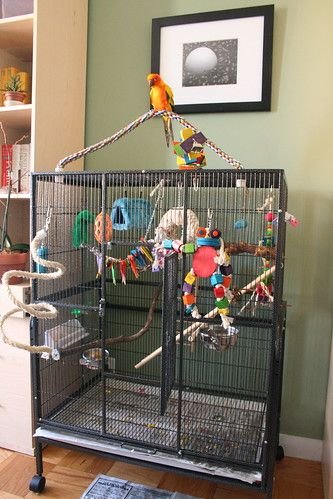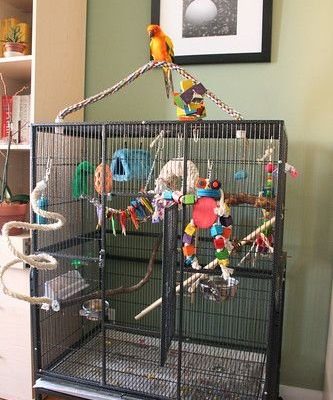
Choosing the perfect cage involves more than just picking one off the shelf. You want your feathered buddy to feel safe and stimulated. Conures are social, curious little beings, so their space needs to reflect that. Let’s dive into the world of conure cages and explore how you can create a lively and comfortable environment for your pet.
Choosing the Right Cage Size
The first step in creating a great cage setup is selecting the right size. Generally, a cage for a conure should be at least 24 inches wide, 24 inches deep, and 36 inches high. Here’s the thing: the bigger the cage, the better! Conures love to stretch their wings and hop around, so giving them ample space is important.
You might be wondering, why does size matter so much? Well, a cramped environment can lead to stress and behavioral issues. Just like humans need personal space, so do our feathered friends. If you have more than one conure or are considering getting another, opt for a larger cage that allows them to coexist comfortably without stepping on each other’s toes.
Materials Matter: Choosing Safe Cage Construction
Next, let’s talk about materials. Not all cages are created equal! It’s vital to choose a cage made from non-toxic materials. Stainless steel or powder-coated metal are excellent choices. Avoid cages with lead or zinc coatings, as these can harm your bird.
You might prefer a cage with a bar spacing of about ½ inch to ¾ inch. This spacing allows conures to climb and explore without the risk of getting stuck. Here’s a fun tip: when looking at different cages, check the sturdiness of the bars. A wobbly cage can lead to instability, which might make your conure feel insecure.
Essential Cage Accessories for Enrichment
Once you have the cage picked out, it’s time to think about accessories. Conures are playful and need stimulation to stay happy. Start with perches. Different sizes and materials are great for keeping their feet healthy. Natural wood perches are a popular choice because they’re comfortable and mimic nature.
Next, add toys! You might consider hanging toys made of wood, rope, or even some bells. Rotate the toys regularly to keep things fresh and exciting. Conures love to chew, climb, and explore, so varying their toys helps prevent boredom and encourages fun, healthy behaviors.
Another accessory to consider is a feeding station. You’ll want bowls for fresh water and food that are easy to clean. Some conure owners use stainless steel bowls because they’re durable and easy to sanitize. Remember, cleanliness is key for your bird’s health!
Creating a Safe and Cozy Environment
Safety is crucial when setting up your conure’s cage. Here are some pointers to consider:
– Positioning: Place the cage in a location that’s away from direct sunlight and drafts. Conures love to be part of family life, so positioning near where you spend time is perfect.
– Covering: Using a cage cover at night can help your conure feel secure and encourage a good sleep. Just ensure the cage is well-ventilated.
It’s also wise to remove any potential hazards around the cage. Keep the area free of toxic plants, small objects they could swallow, or anything they might chew that isn’t bird-safe. Creating a safe zone helps your conure focus on playing and having fun.
Establishing a Routine for Interaction
Conures are social creatures that thrive on interaction. To ensure your conure stays happy and healthy, establish a daily routine that includes time outside the cage. You might want to set aside at least an hour each day for playtime.
During this time, let your conure explore a safe space. Using a play stand or designated bird-safe area can be helpful. Stick to safe toys and activities, and always supervise them when they’re out to avoid accidents.
Remember, consistency is key! Conures appreciate routine, and it builds trust between you and your feathered friend. They’ll come to look forward to your time together, fostering a strong bond.
Choosing the Right Diet for Your Conure
A healthy conure is a happy conure, and that starts with a proper diet. While setting up the cage, consider a feeding routine that includes fresh fruits, veggies, and high-quality pellets specifically formulated for conures.
Make sure to wash fruits and veggies thoroughly before serving them. Some great options include spinach, broccoli, and small pieces of apple or carrot. Avoid feeding them avocado, chocolate, or caffeine, as these can be toxic.
You might also want to add a sprinkle of seeds or nuts as treats, but keep these in moderation due to their high-fat content. A diverse diet keeps your conure active and full of life!
Regular Cleaning and Maintenance
Finally, let’s not forget about cleanliness. Regularly cleaning your conure’s cage is essential for their health. A dirty cage can lead to illness and unpleasant odors.
Aim to clean the cage at least once a week. Here’s a quick routine to help you out:
1. Remove all toys, perches, and food bowls.
2. Scrub the cage surfaces with a bird-safe cleaner or a mild vinegar solution.
3. Rinse thoroughly and dry before putting everything back.
4. Clean food and water dishes daily to keep them safe and fresh.
By maintaining a clean environment, you’re ensuring your conure stays healthy and happy in their beloved space.
In conclusion, creating the best cage setup for a happy and healthy conure involves thoughtful consideration of size, materials, accessories, and cleanliness. Your little feathered friend deserves a space that feels safe and stimulating, just like a cozy home. By following these tips, you’ll not only provide a great living environment but also foster a loving bond that will last for years to come. So, start setting up that perfect space—it’s time for some fun with your playful conure!

